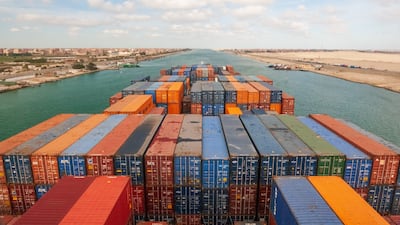Last week, the International Monetary Fund released its Spring World Economic Outlook report, as well as the Regional Economic Outlook for the Middle East and Central Asia.
The global growth forecast was revised slightly higher to 3.2 per cent in 2024, from 3.1 per cent in the January WEO update, with the improvement largely due to greater resilience to higher interest rates in the advanced economies, particularly the US.
The growth forecast for the Middle East and Central Asia was revised slightly lower – to 2.8 per cent in 2024, from 2.9 per cent in January – largely due to the impact of conflict on trade and economic activity, as well as high debt levels in low-income countries in the region. The latter was also the focus of a World Bank report released last week.
However, the outlook for the GCC economies remains relatively robust, with non-oil growth forecast at 3.6 per cent this year and a predicted headline gross domestic product growth of 2.4 per cent.
Emirates NBD’s non-oil growth forecast for the GCC is also 3.6 per cent for 2024, slightly slower than the 3.9 per cent estimated for last year.
Survey data shows that non-oil growth was robust in the first quarter of 2024, with the purchasing managers' index for the UAE and Saudi Arabia in the mid-50s, well in expansion territory and stronger than the global composite PMI in the March quarter.
The PMI surveys suggest that domestic demand has been the main driver of improving business conditions so far this year, with export orders somewhat soft.
While non-oil growth remained robust in the GCC in 2023, despite rising interest rates, we expect the continued impact of those higher-for-longer rates to weigh on both consumption and private investment this year.
The market has significantly repriced expectations for interest rate cuts from the US Federal Reserve, with only 50 basis points of cuts now expected, rather than the 150 bps in cuts anticipated at the start of the year.
Consequently, monetary policy in the GCC will remain tight, deterring some private sector investment and constraining household consumption.
However, we expect public sector investment will continue to underpin non-oil growth in 2024 and beyond, as governments remain committed to pushing ahead with their economic diversification programmes.
The strong balance sheets of GCC governments should allow them to continue to invest in infrastructure and other strategic sectors even against a backdrop of high interest rates, as sovereign debt levels remain low, particularly when compared with oil-importing countries in the region.
Consumer inflation in the GCC has also slowed in the first quarter relative to the same period last year, and remains low by global standards, despite a sharp increase in housing costs in Dubai and Saudi Arabia.
Besides housing, transport is expected to be a source of inflationary pressure in the coming months, as higher global oil prices feed through to petrol and other transport costs in the UAE.
Nevertheless, the IMF expects average inflation in the GCC this year to slow to 2.2 per cent, similar to last year.
Overall, the outlook for the GCC economies remains benign for the time being, notwithstanding the increased geopolitical tension in the region.
However, there is a high degree of uncertainty around the outlook, as highlighted in last week's IMF report.
Disruption to trade flows through the Red Sea has had an impact on shipping costs and supplier delivery times, and higher energy prices may further boost inflationary pressures in developed economies, as well as in some parts of the GCC.
Extended periods of uncertainty and elevated geopolitical risk may also deter foreign direct investment into the region over the medium and longer term, increasing the requirements for funding from the public sector, local banks and the domestic private sector.
Khatija Haque is chief economist and head of research at Emirates NBD

